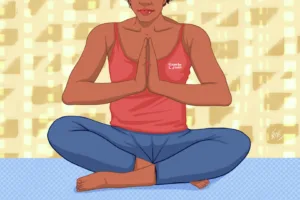Midlife Regrets: How to Deal, Heal, and Move Forward
Do you have midlife regrets – those could have, would have, should haves that keep you up at night? You’re not alone. Midlife regrets are as common as grey hair, wrinkles, and hot flashes except there’s no Nice’n Easy, Botox, or HRT to help you deal with them and heal them.
According to the World Regret Survey, a study conducted by author Daniel Pink involving over 15,000 people in 105 countries, 82 per cent of people said regret is at least an occasional part of their life. Approximately 21 per cent said they feel regret all the time. Only 1 per cent said they never feel regret.
This means that many individuals reach a point in their lives where they start questioning the choices they’ve made and wonder if it’s too late to make a change. But here’s the good news – it’s never too late to create a life you love. If you want to embark on a journey towards a more fulfilling second half of life, however, make peace with your past, enjoy your present, and rock your future as getting over regret is essential.
What is regret?
By the time we reach midlife, we’ve made thousands of choices from who to marry and where to live to what career to pursue. Some decisions go right, some go wrong and the ones that go south can trigger regrets such as: “If only I had acted or behaved differently“, “If only I had said this instead of that, the outcome would have been better“.
Feelings of regret can be about a specific issue or life in general and it’s a difficult emotion. It’s the feeling that your life would have been better and happier if you’d acted or behaved differently. This feeling requires both agency and imagination. You must have a sense that you are in control of your life AND be able to envision an alternative future – one in which you made different choices.
According to a meta-analysis conducted at the University of Illinois, Americans’ six biggest regrets in order of frequency are in the areas of education, career, romance, parenting, self-improvement, and leisure. The authors of the research hypothesise that these areas hold the most regrets because they also have the most opportunity.
According to Neal Roese and Amy Summerville, the authors of the study, “Opportunity breeds regret.” In other words, feelings of regret – dissatisfaction and disappointment – are greatest when you clearly have more choices for change, growth, and renewal.
Understanding midlife regrets
At midlife regret is common and difficult for several reasons. First, by the time we reach middle age most of us have numerous unrealized expectations. We’re grappling with the fact that we’re running out of time and dreams and goals that once felt attainable may never happen.
Second, midlife is ripe for reflection and reevaluation especially if we don’t like aspects of our lives. We get philosophical, examining life choices and priorities wondering, “How did I get here?” which can trigger regret.
Third, societal pressures and norms around career success, financial stability, and family life can make you feel like you haven’t achieved enough. Social comparison can intensify regret. You scroll through your Facebook and Instagram feeds and it can feel like everyone is living a beautiful life BUT you.
Finally, numerous changes and shifts like an empty nest, losing a parent, or realizing that your marriage isn’t as fulfilling as you anticipated it would be on your wedding day can make you regret prior decisions and behaviours. When the kids are gone and you’re facing divorce, you may regret not putting yourself first. If you’ve lost a parent, you may regret not spending more time with them or sharing your feelings.
The real problem with midlife regrets
The real problem with midlife regrets isn’t that you made mistakes that you believe sent you in the wrong direction. The real problem is that regrets can keep you stuck in reverse. You create your midlife and experience reality through a rearview mirror seeing the worst of what’s behind you rather than imagining the best of what’s to come.
Instead of dealing with and healing, many midlife women obsess over regrets. Rather than taking action to create a fulfilling future, they ruminate chewing over the past repeatedly in their mind in a futile attempt to figure out how to change what has already occurred.
While ruminating can feel like a productive strategy because your brain is trying to figure out a way to fix the past, it’s like gunning the engine when your tires are stuck in the mud. The harder you press down on the accelerator, the deeper your tires sink and the less traction you have.
According to the late Yale professor and psychologist Susan Nolen-Hoeksema, author of ‘Women Who Think Too Much‘, there is evidence that “Rumination exacerbates depression, enhances negative thinking, impairs problem-solving, interferes with instrumental behaviour, and erodes social support.”
Ruminating over your regrets keeps your vibe low preventing you from manifesting the joy and happiness that you truly want at midlife. Focusing on regret is also a type of self-hatred that can harm your well-being especially if you are already prone to anxiety, depression, and insomnia.
Regret feels bad because it’s saturated with self-blame. To make matters worse, it’s often accompanied by guilt – I did something wrong – or worse shame the toxic emotion of “there’s something wrong with me.” Like menopause, regret can increase stress, disrupt hormonal balance, and negatively impact your immune system.
Fortunately, you can take steps to transform your regrets and use them as fuel for personal growth and development. What’s key is striking a balance between feeling, dealing with and healing regrets without letting them overwhelm you. Doing so can help you move into a freer more enlightened place of self-awareness, self-acceptance, and self-love.
How to overcome midlife regrets
Rather than ignoring or obsessing about your regrets, why not try following these steps to transform your regrets, increase your well-being, and experience more joy, love, and truth.
- Acceptance
While you may want to deny your regrets, suppress your feelings (or wash them away with a bottle of chardonnay), beat yourself up, or perseverate, acknowledging and accepting them is key.
In the words of the psychiatrist Carl Jung, “What we resist persists.” What he meant is that the more you struggle with or avoid things in life the more you attract them.
Instead of ruminating, use the following simple mantra to give your emotions some space: “Name it you tame it, feel it you heal it.”
Naming the emotion helps you get unstuck because it brings emotions from the primitive part of your brain to your frontal cortex where they can be processed. Since emotions are felt experiences in the body, feeling the physical sensations generated by regret facilitates the healing process.
Simply state the emotion that comes up when you think about past regrets. For example, you regret not having children and feel sad; or you’re ending a relationship and feel angry. Then notice where you feel the emotion in your body. For example, you may feel sadness in your chest around your heart and anger in your head.
Memorizing and reciting the following Serenity Prayer is another powerful way to help foster acceptance: “God grant me the serenity to accept the things I cannot change; Courage to change the things I can; And wisdom to know the difference.”
- Practice self-compassion
Self-compassion entails treating yourself the way you would a good friend. According to self-compassion pioneer Kristin Neff, it has three elements: self-kindness, common humanity, and mindfulness.
With self-compassion, you are kind and forgiving towards yourself rather than judgmental and self-critical. This means that instead of beating yourself up for past mistakes your self-talk and stance towards yourself are supportive, understanding, and helpful.
With common humanity you acknowledge that everyone fails, makes mistakes, and has regrets. When you realize we are all imperfect beings, you don’t feel so isolated and alone when experiencing regret.
The third element, mindfulness encourages you to give yourself what you need when you are suffering. So instead of overthinking, which increases suffering, you practice self-care to nurture and soothe yourself.
Here’s a tip to help you practice self-compassion: make a list of ways you like to take care of yourself such as taking a bath, listening to music, spending time with friends, journaling, or going for a long walk. When you’re struggling take out the list and pick something that will soothe you.
One of the kindest, most compassionate things you can also do for yourself is engaging in mindfulness, i.e. staying in the present rather than ruminating about the past or worrying about the future. Practices like yoga and meditation increase mindfulness and reduce activity in the default mode network, a part of your brain that is involved with mind wandering, worry, and rumination.
- Apologize
Has the action you regret hurt others? Consider making amends. This could entail a visit, phone call, letter, or email.
If the offended party isn’t open to your apology, use the Ho’oponpono prayer, an ancient Hawaiian practice for forgiveness and reconciliation. Simple and effective, it can help you heal and find peace by releasing thoughts and beliefs that are no longer serving you.
Visualize the person you want to apologize to and repeat the following prayer: “I’m sorry. Please forgive me. I forgive you. Thank you. I love you.“
You can also use this prayer to help you forgive yourself.
- Seek support
You don’t have to go it alone. Talk to a good friend, therapist, coach, or family member that you can confide in.
Consider joining a support group. Whatever midlife regret you have, there are hundreds of other midlife women who have made similar mistakes and are there to guide you. Joining a support group is also a great opportunity to use what you’ve learned from the past to support others. Sharing your wisdom can help you heal and move forward. It may even help you find a silver lining and a sense of purpose.
- Grow wiser
Once you’ve started working on the first three steps to facilitate healing you’re ready to examine the situation to deepen self-knowledge and grow wiser. Pull out your journal and use these prompts to increase understanding:
- What have I learned from my mistake(s)?
- How did these experiences shape me as a person? Reframe your perspective by seeing regrets as opportunities to learn and grow.
- Where are the silver linings?
- What would I tell my younger self? Can you acknowledge that while your present self would never have made the same choices, your younger self was doing the best she could?
- How can I use these insights to make better and wiser choices in the future?
- Create new goals and experiences
Midlife can be a powerful time of reinvention and transformation and the gateway to the best decades of your life. What’s key is creating new opportunities to explore what interests you.
One of the most powerful things you can do with regrets is use them as motivation and guidance for new goals.
For example, if you regret not having kids can you create ways to have fulfilling relationships with children by volunteering to mentor a child through a local school or an organization such as Big Brothers Big Sisters?
If you regret not saving enough for retirement meet with a financial planner, find ways to budget and save, or start a side hustle.
Regret getting out of shape and gaining weight? It’s never too late to transform your body and even get in the best shape of your life by eating right and exercising regularly.
Sara, one of my clients, biggest regret was that she was divorced and didn’t have a life partner and children. In our work together, I helped her see that while after a failed marriage while staying single felt safe it wasn’t what she wanted.
To demonstrate that it wasn’t too late to create the experiences she longed for, I shared my own story of divorce after a 25-year marriage and then falling in love with a wonderful man at 57!
Rather than staying stuck in regret, Sara faced her own intimacy fears, healed her relationship regrets, and started dating again. Eventually, she met a great guy who had two grown children and a grandchild. By examining her regret, reframing it as a desire, leaning into possibility, and acting she’s now experiencing her heart’s desire – being a partner and a parent.
- Learn from other’s regrets
While you can’t live a life free of regrets, because making mistakes is part of being human, at midlife you can transform yourself so that when you get to the end of your life, you feel like you’ve lived to the fullest.
Contemplating the regrets of the dying can help you make necessary changes and make the most of your precious life. According to Australian author and caregiver Bronnie Ware, the 5 top regrets of dying are:
1) “I wish I’d had the courage to live a life true to myself, not the life others expected of me.”
2) “I wish I hadn’t worked so hard.”
3) “I wish I’d had the courage to express my feelings.”
4) “I wish I had stayed in touch with my friends.”
5) “I wish I had let myself be happier”.
- Be BOLD
Reaching midlife is a miracle. Until the 20th century, the average life expectancy was about fifty-five. You managed to get through menopause, say goodbye to the kids, and then you croaked!
Today the average life expectancy of women in the United States is eighty and a half years. Reach sixty-five, and there’s a 46 per cent chance that you will live to ninety.
Take a moment. Subtract your current age from ninety, and you’ve got a whole lot of living to do. How will you spend those decades? Hopefully not living stuck in regret.
Yes, take time to process the pain of regret and learn from it, but once you’ve done that, let go of regrets. Don’t wear regrets like an old dress that no longer fits.
Choose to change. Be bold. Have adventures. Trust your gut. Step outside your comfort zone and do what scares you. Be more afraid of having regrets for not doing what’s on your bucket list than acting. While the safe path may feel easier now, it may lead to regrets later.
At midlife, you’re gifted with an entire second adulthood to know and love yourself on a deeper level. To figure out who you are and what you want. Take all the mistakes you made in your first adulthood, throw them in a makeover blender, and create a smoothie of existence.
Like this post? Support Us or Sign up to our newsletter to get more articles like this delivered straight to your inbox!






